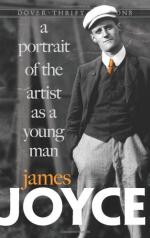Stephen watched the three glasses being raised from the counter as his father and his two cronies drank to the memory of their past. An abyss of fortune or of temperament sundered him from them. His mind seemed older than theirs: it shone coldly on their strifes and happiness and regrets like a moon upon a younger earth. No life or youth stirred in him as it had stirred in them. He had known neither the pleasure of companionship with others nor the vigour of rude male health nor filial piety. Nothing stirred within his soul but a cold and cruel and loveless lust. His childhood was dead or lost and with it his soul capable of simple joys and he was drifting amid life like the barren shell of the moon.
Art thou pale for weariness
Of climbing heaven and gazing on the earth,
Wandering companionless... ?
He repeated to himself the lines of Shelley’s fragment. Its alternation of sad human ineffectiveness with vast inhuman cycles of activity chilled him and he forgot his own human and ineffectual grieving.
* * * * *
Stephen’s mother and his brother and one of his cousins waited at the corner of quiet Foster Place while he and his father went up the steps and along the colonnade where the Highland sentry was parading. When they had passed into the great hall and stood at the counter Stephen drew forth his orders on the governor of the bank of Ireland for thirty and three pounds; and these sums, the moneys of his exhibition and essay prize, were paid over to him rapidly by the teller in notes and in coin respectively. He bestowed them in his pockets with feigned composure and suffered the friendly teller, to whom his father chatted, to take his hand across the broad counter and wish him a brilliant career in after life. He was impatient of their voices and could not keep his feet at rest. But the teller still deferred the serving of others to say he was living in changed times and that there was nothing like giving a boy the best education that money could buy. Mr Dedalus lingered in the hall gazing about him and up at the roof and telling Stephen, who urged him to come out, that they were standing in the house of commons of the old Irish parliament.
—God help us! he said piously, to think of the men of those times, Stephen, Hely Hutchinson and Flood and Henry Grattan and Charles Kendal Bushe, and the noblemen we have now, leaders of the Irish people at home and abroad. Why, by God, they wouldn’t be seen dead in a ten-acre field with them. No, Stephen, old chap, I’m sorry to say that they are only as I roved out one fine May morning in the merry month of sweet July.
A keen October wind was blowing round the bank. The three figures standing at the edge of the muddy path had pinched cheeks and watery eyes. Stephen looked at his thinly clad mother and remembered that a few days before he had seen a mantle priced at twenty guineas in the windows of Barnardo’s.




